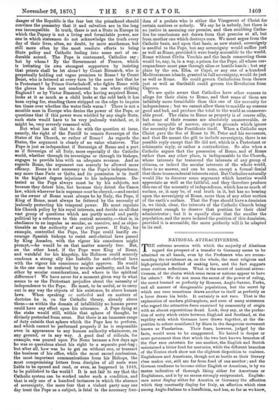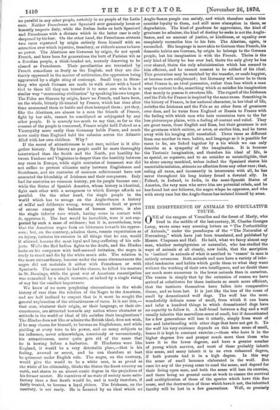NATIONAL ATTRACTIVENESS. T HE extreme aversion with which the majority of
Alsatians regard the prospect of a transfer to Germany seems to be admitted on all hands, even by the Professors who are recom- mending the ravishment as, on the whole, the most religious and high-principled method of making love, and the fact suggests some curious reflections. What is the secret of national attrac- tiveness, of the charm which some races or nations appear to have for others ? We do not mean the secret of the power of ruling, the secret learned so perfectly by Romans, Anglo-Saxons, Turks, and all manner of disagreeable populations, but the secret by which one race sometimes draws another to itself as perfectly as a lover draws his bride. It certainly is not race. That is the explanation of modern philosophers, and even of many statesmen who regard the attractive force exercised by community of origin with an almost superstitious dread. Look, they say, at the perfec- tion of unity which exists between England and Scotland, at the rapidity with which Germans have drawn together, at the dis- position to cohere manifested by Slays in the dangerous movement known as Panslavistn. Their fears, however, judged by the facts, would seem to be exaggerated. No hatred is deeper or more permanent than that which the two best known branches of the Slav race entertain for one another, the English and Scotch maintained a bitter feud for centuries, while the different branches of the Teuton stock show not the slightest disposition to coalesce. Englishmen and Americans, though not so hostle as their literary class makes out, still are far from fond of one another ; and the German readiness to become either English or American, is by no means indicative of thorough liking either for Americans or Englishmen, and is by no means strongly reciprocated. English- men never display either for America or Germany the affection which they constantly display for Italy, an affection which rises among Anglo-Italians to a fanaficism, and has, so far as we know, no parallel in any other people, certainly in no people of the Latin race. Neither Frenchman nor Spaniard ever genuinely loves or honestly respects Italy, while the Italian looks on both Spaniard and Frenchman with a distaste which in the latter case is only deepened by his fear. On the other hand, the Frenchman attracts two races separated by origin entirely from himself with an attraction over which injustice, treachery, or ridicule seems to have no power. The Alsatians are Germans by origin, do not speak French, and have been for generations the butt of Parisian wit as a Boeotian people, a thick-headed set, scarcely deserving to be classed as Frenchmen. Their peculiarities are travestied by French comedians as freely as the English, and they are dis- tinctly oppressed in the matter of cultivation, the oppression being aggravated by a slight sting of contempt. Small boys in Stras- burg who speak German are made to walk about with a board tied to them till they can transfer it to some one who is in a similar way "contemning civilization" by speaking his own tongue. The Poles are Slavons by origin, know no French, and have been, on the whole, bitterly ill-treated by France, which has time after time summoned them to battle and then betrayed them ; yet they, like the Alsatians, are almost to a man the friends of France, fight by her side, cannot be conciliated or subjugated by any other people. It is scarcely too much to say that, as far as the consent of the people is concerned, France might hold Poland as a Viceroyalty more easily than Germany holds Posen, and much more easily than England held the colonies across the Atlantic filled with her own children. Why ?
If the secret of attractiveness is not race, neither is it alto- gether history. By history no people could be more thoroughly intertwined than the South and the North, yet hostility be- tween Yankees and Virginians is deeper than the hostility between any races in Europe, while eight centuries of incessant war did not suffice to prevent ultimate unity between Englishmen and Scotehmen, and six centuries of common achievement have not cemented the friendship of Irishmen and their conquerors. Italy had for centuries no common history, yet its people became one ; while the States of Spanish America, whose history is identical, fight each other with a savageness to which Europe affords no parallel. On the other hand, the single people in the world which has to avenge on the Anglo-Saxon a history of wilful and deliberate wrong, wrong without limit or power of excuse except the badness of human nature, is also the single inferior race which, having come in contact with it, approves it. The fact would be incredible, were it not sup- ported by such a mass of evidence ; but it is, nevertheless, true that the American negro feels no bitterness towards his oppres- sors; but, on the contrary, admires them, resents expatriation as an injury, imitates his enemies in all things that he can, would if allowed, become the most loyal and long-suffering of his sub- jects. While the Red Indian fights to the death, and the Hindoo looks on his conqueror with half-amused irritation, the negro is ready to stand and die by the white man's side. The relation is the more extraordinary, because under the same circumstances the negro did not maintain it either with Frenchmen or with Spaniards. The moment he had the chance, he killed his masters in St. Domingo, while the great war of American emancipation was unmarked by a single massacre, or indeed by a single rising of any but the smallest importance.
We know of no more perplexing circumstance in the whole history of race than the relation of the Negro to the American, and are half inclined to suspect that in it must be sought the general explanation of the attractiveness of races. Is it not this,— that men, whatever their origin, or their language, or their cir- cumstances, are attracted towards any nation whose character or attitude in the world or ideal of life satisfies their imaginations ? The Hindoo does not like or admire the British ideal, does not wish, if he may choose for himself, to become an Englishman, and while yielding at every turn to his power, and on many subjects to his influence, never acknowledges, consciously or unconsciously, his attractiveness, never quite gets rid of the sense that he is bowing before a barbarian. If Hiudostan were like England, it would be a very detestable place,—that is his feeling, avowed or secret, and he can therefore at best be quiescent under English rule. The negro, on the contrary, would give the world to be a white man, is as proud as the white of his citizenship, thinks the States the finest country on earth, and shares to an almost comic degree in the prejudices of his former master. He conceives of no state of society more satis- factory than a free South would be, and is ready therefore, if fairly treated, to become a loyal citizen. The Irishman, on the contrary, is not ready. He is taunted by an ideal which no Anglo-Saxon people can satisfy, and which therefore makes him consider loyalty to them, and still more absorption in them, as degradation. The kind of goodness he appreciates, the kind of greatness he admires, the kind of destiny he seeks is not the Anglo- Saxon, and no amount of justice, or kindliness, or equality ever completely reconciles him to his fate. The Alsatian, again, is reconciled. His language is more akin to German than French, his domestic habits are German, by origin he belongs to the German people, but his imagination is with the French. Theirs is the only kind of liberty he has ever had, theirs the only glory he has ever shared, theirs the only administration which has seemed to him efficient, and he cannot consent to be robbed of his ideal. This generation may be enriched by the transfer, or made happier, or become more enlightened ; but Germany will never be to them what France is, an ideal possession, rather than lose which a man may be content to die, something which so satisfies his imagination that merely to possess it sweetens life. The regard of the Irishman and the Pole for France is inspired by the same cause. Something in the history of France, in her national character, in her ideal of life, satisfies the Irishman and the Pole as no other form of greatness ever does, and he turns from England or Russia to France with the feeling with which men who hate mountains turn to the far less picturesque plains, with a feeling of content and relief. They are great races, these English and Russ, but their greatness is not the greatness which entices, or awes, or excites him, and he turns away with his longing still unsatisfied. Three races as different from one another in race, habits, and language as it is possible for races to be, are linked together by a tie which we can only describe as a sympathy of the imagination. It is because the Teutonic imagination, and therefore his ideal of life, is so special, so separate, and to an outsider so unintelligible, that he alone among mankind, unless indeed the Spaniard shares his unenviable isolation, attracts no affection from any other race; that, ruling all races, and incessantly in intercourse with all, he has never throughout his long history found a devoted ally. In Poland, in Ireland, in India, in the semi-Spanish States of America, the very men who serve him are potential rebels, and he has found but one follower, the negro whqm he oppresses, and who with every race but the Anglo-Saxon has isolated himself by arms.



































 Previous page
Previous page